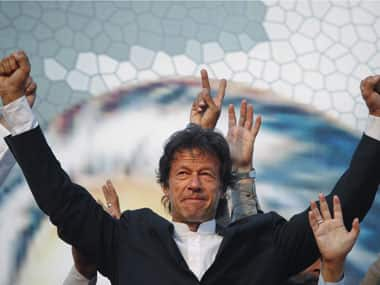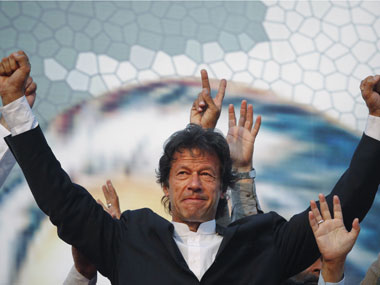“God, he’s so good-looking,” purrs a friend when I mention meeting Imran Khan. “Umm, the actor not cricketer,” I correct her and she looks promptly crest-fallen. There is only one Imran for women of a certain age, and it’s not some cherub-faced Bollywood hero who makes teenagers swoon. Decades ago, Sarfaraz Nawaz raised eyebrows and more when he said (as I unreliably recall), “Women in Pakistan get charged up every time Immy rubs the ball against his trouser.” Through all his varied and bewildering incarnations — from playboy to cricketing legend to born again Islamist — Mr Khan has remained reliably sexy, in reputation, at least. It is only fitting then that Madiha Tahir’s meticulously observed, richly reported cover story on the man in Caravan begins so [Do read it here ]:
Sex or at least the idea of it, is never far from Imran Khan. It reveals itself in the casual remark of an urbane 20-something friend, a well-educated and usually sensible woman who turned to me and said that she would “do Imran”. “You know,” she further explained, “as a feather in my cap.” It sometimes hangs in the air, almost visible, and as thick as the cloying perfume of the “aunties”—well-heeled middle-aged housewives clutching their fading youth as desperately as they do the last yard of cloth at designer lawn sales—who thrash and push and shove, banging lesser folk with their bulky handbags so they can rub shoulders with Imran, if only for a furtive moment.
[caption id=“attachment_171058” align=“alignleft” width=“380” caption=“The Pashtun who with his Tehrik-e-Insaf party hopes to someday lead the tumultuous nation. “]
 [/caption] Mr Khan has leveraged that libidinal effect at every stage in his life, to leverage his cricketing career, to land an uppercrust English wife and therefore entree into her lofty circles, and now as a powerful weapon in his political arsenal. Tahir paints a vivid picture of the sweaty, adoring crowds drawn to his increasingly large political rallies, eager for a glimpse of greatness:
[/caption] Mr Khan has leveraged that libidinal effect at every stage in his life, to leverage his cricketing career, to land an uppercrust English wife and therefore entree into her lofty circles, and now as a powerful weapon in his political arsenal. Tahir paints a vivid picture of the sweaty, adoring crowds drawn to his increasingly large political rallies, eager for a glimpse of greatness:
As far as I could remember, he hadn’t actually turned around to look at the crush of people clamouring to get up the staircase and be near him—but he knew. He basked in their fervour—junoon, even—and in return, he mirrored back to them their best idea of themselves.
It’s a revealing moment not just of Imran Khan but of the nation he seeks to lead out of the wilderness. A nation desperately in search of a messiah, of that great Pashtun hope who will save them all. Tahir’s essay is most insightful when it draws connections between the fault-lines within Pakistani society and the contradictions and lacunae in Khan’s politics. The secular intellectual class feels betrayed by a man who they once mistook for a symbol of western liberalism, who now touts Islamic virtue as the catch-all solution for Pakistan’s political woes. He in turn accuses them of being ivory tower reformers, isolated and detached from the realities of their own nation. Yet neither seems to entirely grasp the tortuous complexity of their national predicament, preferring instead the comfort of sweeping condemnations and avowals. If Pakistan is indeed in need of a messiah, there is little doubt – at least in my mind – that Khan is the wrong man for the job. He waves away the threat of “talibanization”; speaks of reform without ever speaking against the establishment, i.e. the army, past dictators, or the ruling families; pretends that Islamic law can protect secular values such as freedom of speech. Over and again, he takes untenable positions with a hectoring moral certainty that is likely to be his undoing in the long run. Khan’s much-touted powers of seduction now evoke a blinding desire that bodes ill for the future. What emerges is a portrait of leader who mistakes popularity for vision. As he attempts to be everything to everyone, the swelling crowds and their devotion confirm his misplaced sense of conviction — or to be more accurate, that insufferable arrogance that has always been his greatest failing. And that’s not good news, be it for Khan or his country or the rest of us. We’re all holding out for Pakistan’s last, great hope. I’ve quoted but a small slice of Tahir’s long, multi-layered essay – “I’ll be your Mirror” – which is chock-a-block with revelatory interviews and reporting. I recommend you read it in its entirety on the Caravan website .
)